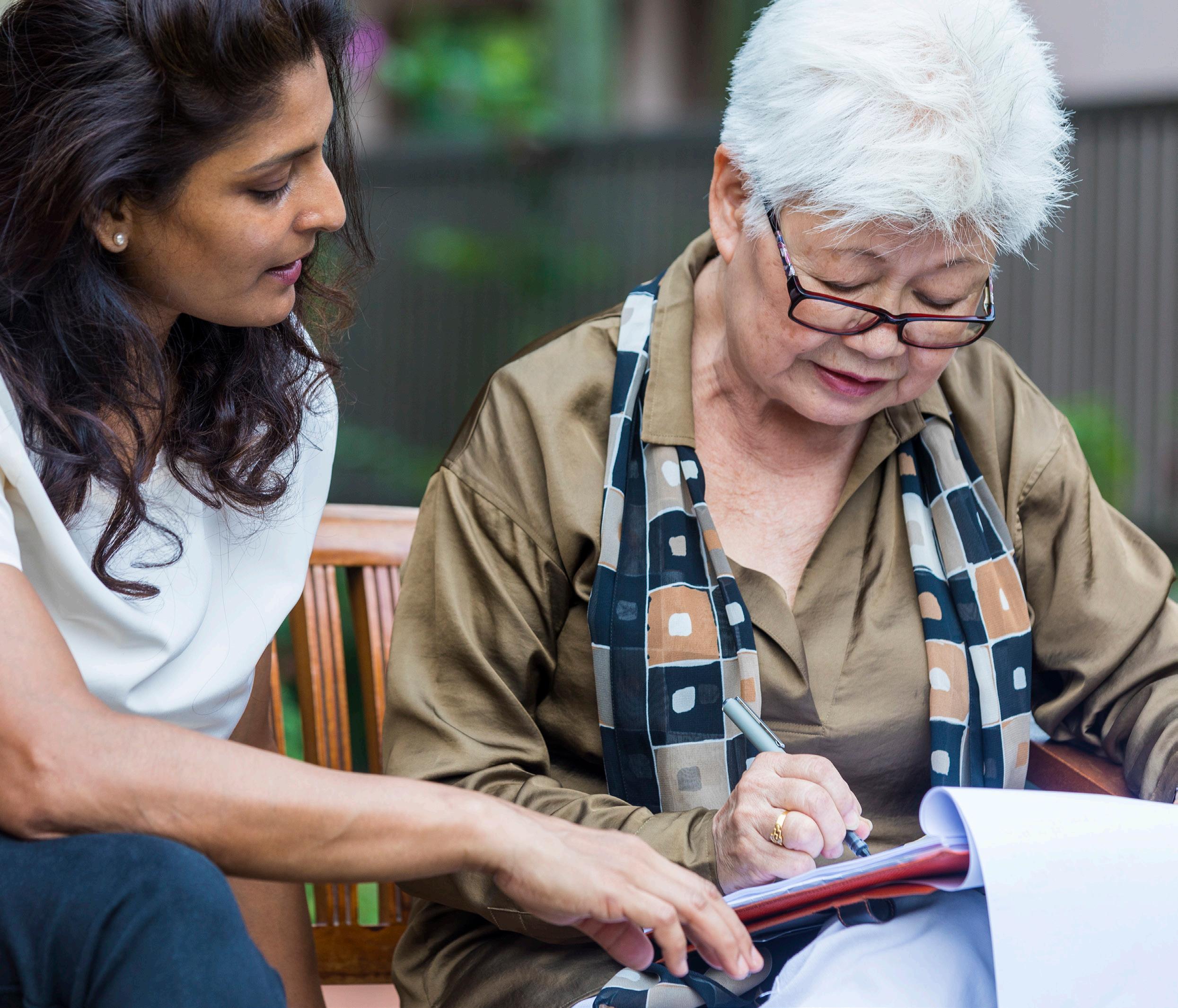
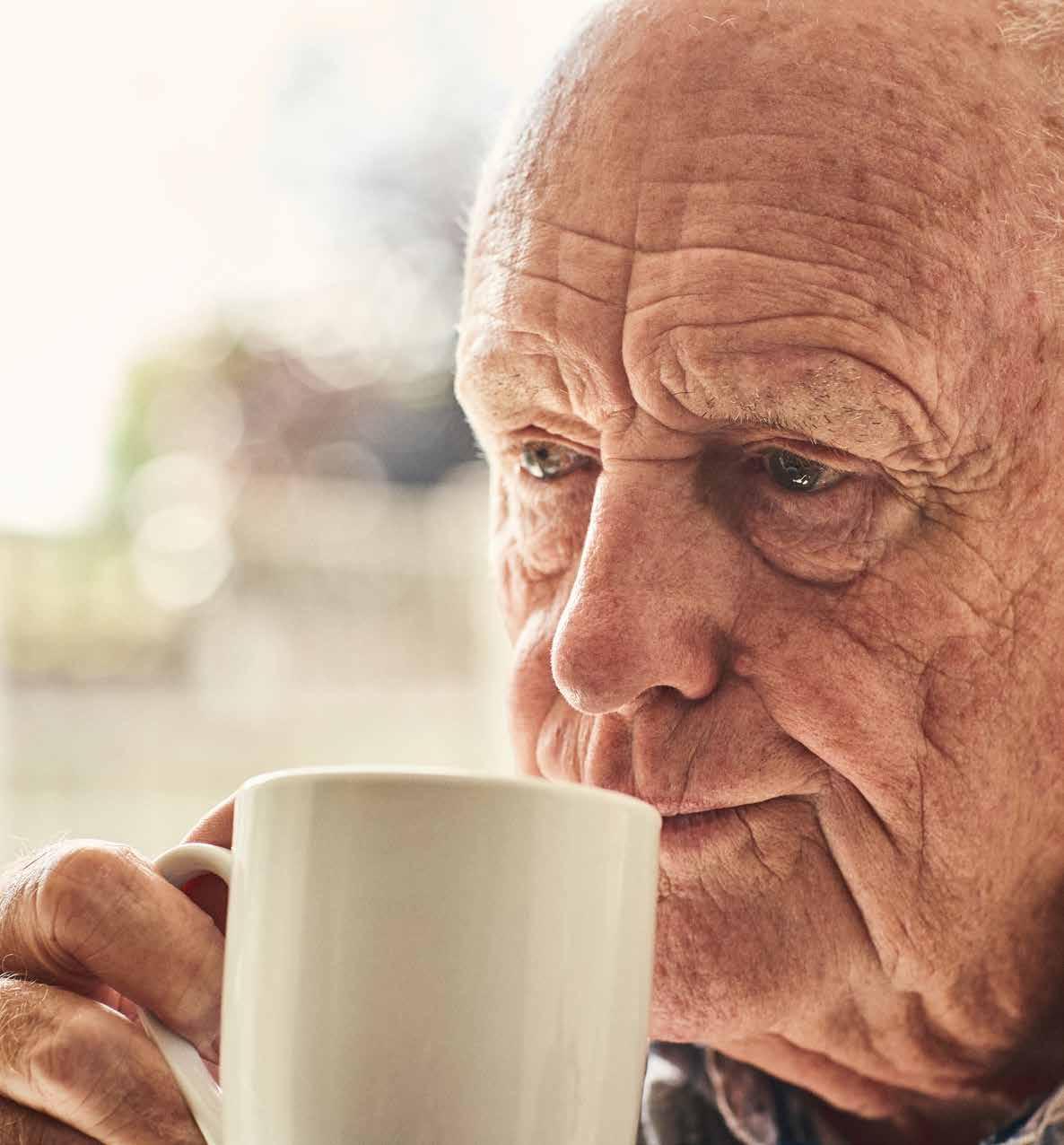


ISSUE 01, 2023 Keep Moving | Friends with the Visitor Service Advance Care Planning - What Matters to You? www.acwellington.org.nz 04 499 6646 SENIORS WEEK HELPING END LONELINESS ANNUAL APPEAL 2022 For advertising phone Sam 027 872 6629 or email samanta@kiwipublications.nz A Kiwi Publications Limited publication | www.kiwipublications.co.nz | Please refer to website for disclaimer SUMMER 2022/23 www.acwellington.org.nz Seniority SENIORITY SENIORITY WWW.ACWELLINGTON.ORG.NZ 04 499 6646 Keep Moving Census Help Advance Care Planning - What Matters to You?
From the CEO
Over my summer holiday I went for two hikes. The first was up Rangituhi / Colonial Knob in Porirua. At the top I could see Kapiti Island and Paraparaumu to the north, D’Urville Island to the west and the Kaikoura Ranges to the south. My next walk took me over the Manawatu Gorge track from Ashurst to Balance Bridge near Woodville, and back again. Both hikes tested my fitness, especially my knees!

I really enjoyed being in the native bush, seeing the birds and the sense of achievement at the end of the day. I slept pretty well too!
I was inspired just before Christmas when I met a participant at one of our Steady As You Go classes. He had made such remarkable strides in his fitness since coming to the class that it was changing his life. The weekly exercises had improved not just his physical wellbeing but his outlook as well. I am really pleased to say that his progress is a common theme we often hear from people participating in our programmes.
I know that I won’t always be able to do hikes like that, but I reckon the more mobile I am, the better my physical and mental health will be, just like the Steady As You Go participant I met.
Getting outside for a walk is one of the best forms of exercise. Walking has been shown to have many benefits including improved joint mobility, muscle strength and circulation, reducing stress and improving memory, and yes, better sleep and more energy.
Doing whatever you can to remain mobile is such an important part of ageing well. Maybe it’s a short walk to the letterbox each day, a longer walk with an Age Concern Companion Walker, or a weekly visit to a Steady As You Go class – keep moving! As my staff
sometimes say, “Move it or lose it.”
exclusion of any product does not mean that the publisher or Age Concern advocates or rejects its use.
I hope you enjoy this issue of Seniority magazine and do contact us if you’d like to know more about how we can help you keep moving.
 Stephen Opie
Age Concern Wellington Region CEO
Stephen Opie
Age Concern Wellington Region CEO
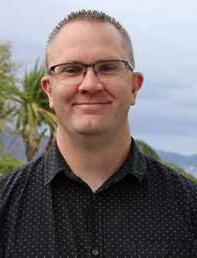
2 SENIORITY | Serving the needs of older people
Go to www.facebook.com/ ageconcernwellington/ to follow us on Facebook. From Stephen Age AGE CONCERN | Serving the needs of older people 2 inspires continued they see isolation In appeal. individuals going. services can’t all Many we’re around Government. the Wellington too see contributing, consider As a Thank look you
Contact Information
Phone: 04 499 6646
Contact Information
Email: news@acwellington.org.nz
Phone: 04 499 6646
Address:
Email: news@acwellington.org.nz
Level 1, 138 Wakefield Street, Wellington
Address: Level 1, 138 Wakefield Street, Wellington
Postal Address: PO Box 11108, Wellington 6142
Postal Address: PO Box 11108, Wellington 6142
Website: www.acwellington.org.nz
Facebook:
Website:
www.acwellington.org.nz
www.facebook.com/ageconcernwellington
Facebook: www.facebook.com/ageconcernwellington
Disclaimer
The views expressed in this newsletter are not necessarily those of Age Concern Wellington Region The inclusion or exclusion of any product does not mean that Age Concern advocates or rejects its use
Disclaimer
The views expressed in this newsletter are not necessarily those of Age Concern Wellington Region. The inclusion or exclusion of any product does not mean that Age Concern advocates or rejects its use.
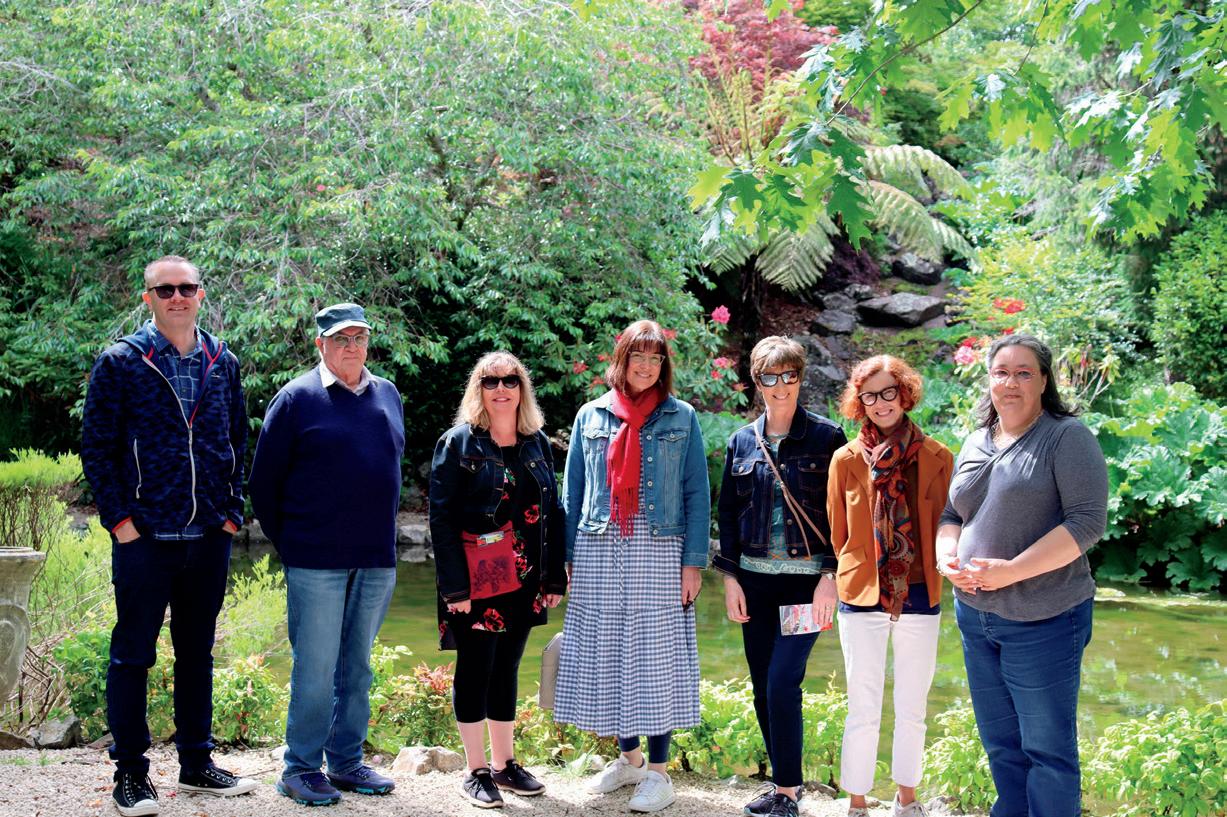
Can You Help?
You can help us reach more lonely and isolated seniors. Do you have time to volunteer a few hours of your time? Or are you able to make a donation? Call 04 499 6646 or scan the QR code above for more information.
Can You Help?
You can help us reach more lonely and isolated seniors. Do you have a couple of hours a week you can spare? Or are you able to make a donation? Call 04 499 6646 or scan the QR code on page 2 for more information.
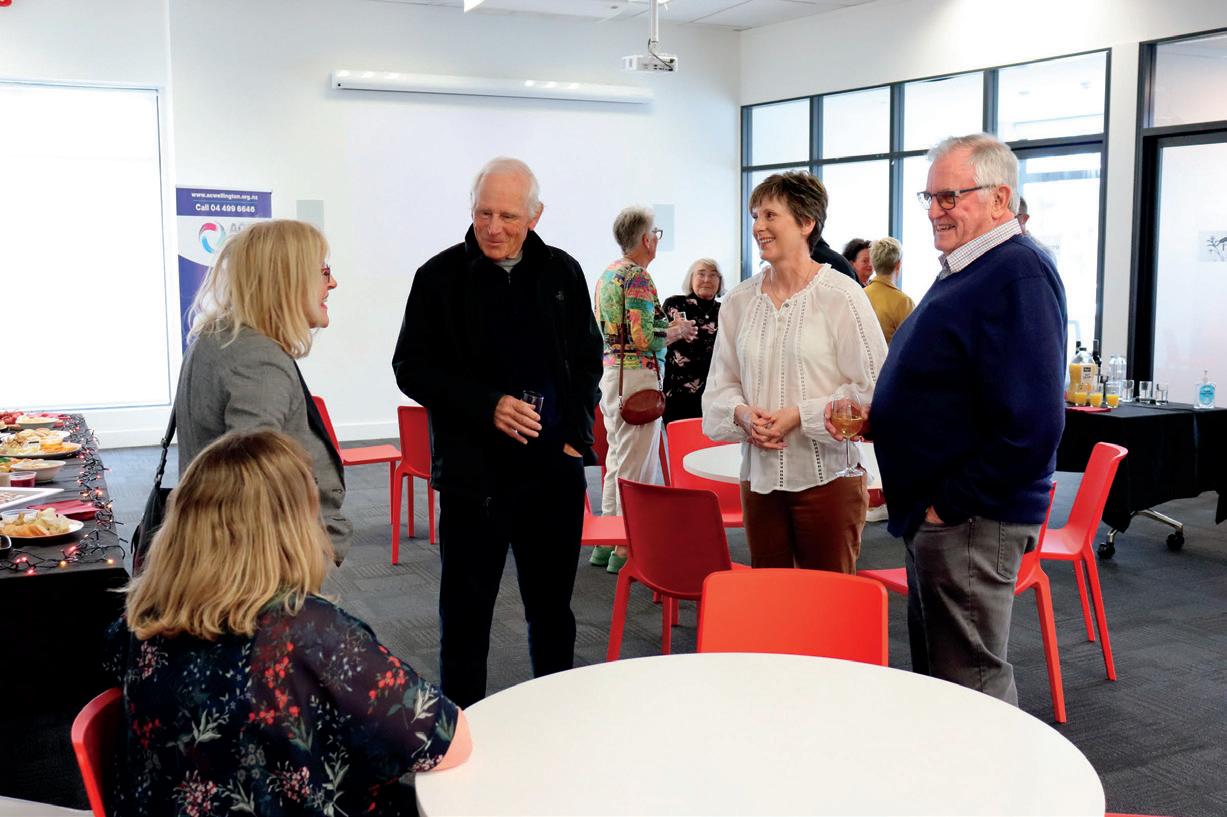
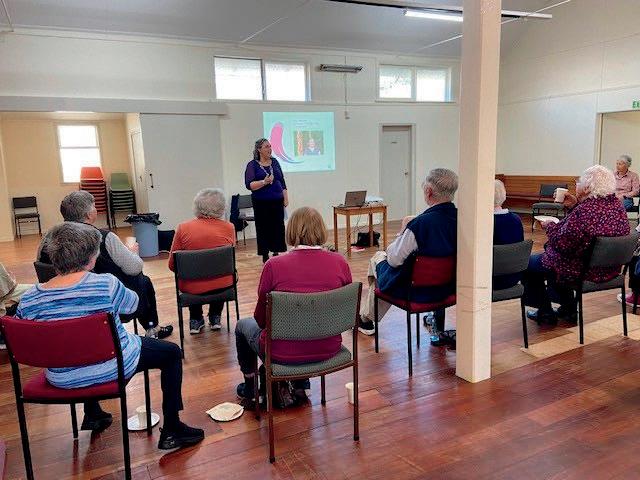
We are in need of a few specific items as well Maybe you can you help? We're looking for:
We are in need of a few specific items as well. Maybe you can you help? We’re looking for:
• a projector
• a reliable car
• a plug-in coffee urn
a projector a reliable car a plug-in coffee urn a large office plant
• a large office plant
3 ISSUE 01, 2023 | WELLINGTON
SENIORITY 3
Mobility is a Life’s Work
Mick Calder supports Age Concern’s communications team as a volunteer. He is a ‘young’ octogenarian who inspires us with his adventures! Mick writes about what it really means for seniors to keep moving...
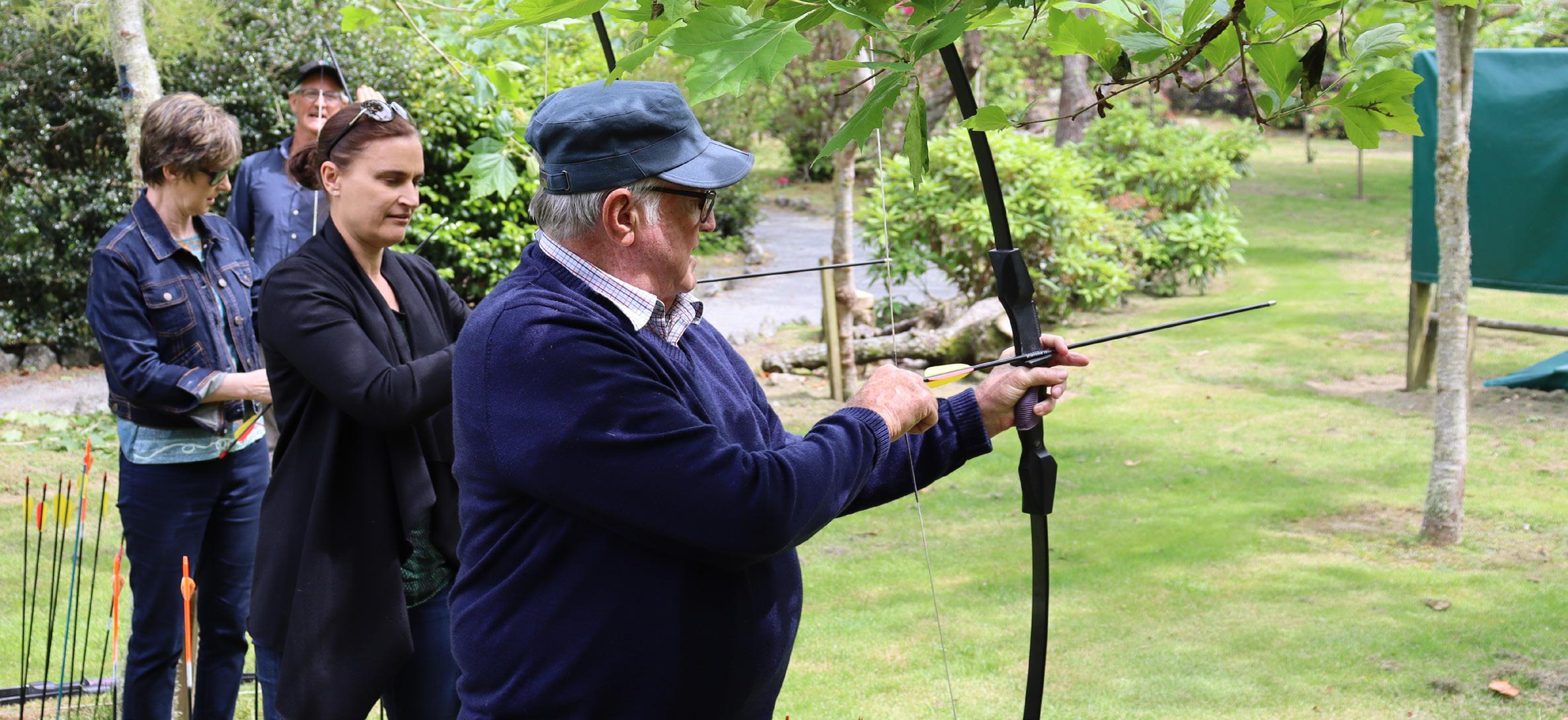
As you get older, you may find it gets easier to convince yourself that you don’t need to be as active as you once were...
You have probably retired and don’t need to keep to rushing around going to meetings and complying with the various stresses and strains of the daily rat race.
That is a big mistake. According to all the available advice, it is better to stay as active as you possibly can, for as long as you can. This means maintaining your mobility.
Mobility is the ability to move or walk freely and easily. But as we get older our mobility changes. This can be due to adjustments in
gait (how we walk to compensate for dodgy joints), balance and physical strength. Loss of mobility is partly the cause of an increase in the number of falls and the severity of any injuries sustained. The injuries suffered as a result of falls can be life-changing.
The problem is that those who lose their mobility have a poorer quality of life, are less likely to remain living at home, have higher rates of disease, disability, hospitalisation, and death than those who maintain an active lifestyle.
Many western governments, including ours, have guidelines for physical activity for older people. They usually aim to help maintain mobility and prevent disability as we age.
They all seem to repeat similar messages – it is better to stay active as you get older, which should improve your health and wellbeing as well as making it easier to perform daily tasks.
4 SENIORITY | Serving the needs of older people
MICK CALDER
The Government provides a list of recommendations. I thought I would see whether I was being as active as I should.
1. Be as physically active as possible and limit sedentary behaviour. I try playing nine holes of golf once a week (weather permitting) and pétanque twice a week, plus occasional walks around the waterfront. But I also enjoy a siesta every now and again. Could do better.
2. Consult an appropriate health practitioner before starting or increasing physical activity. Does a regular annual check-up session with my GP qualify? He signed a release for me when I volunteered for an exercise programme with a student from the Institute of Sport.
3. Start off slowly and build up to the recommended daily physical activity levels. Good advice as you don’t want to overdo it and injure yourself. For me, this advice is superfluous as I have been trying to be active for some time. I always do some warm-up stretches etc when playing golf.
4. Aim to do aerobic activity on five days per week for at least 30 minutes if the activity is of moderate intensity; or 15 minutes if it is of vigorous intensity; or a mixture of moderate- and vigorous-intensity aerobic activity. I think this is probably the most difficult instruction to comply with as some days are better than others for such activities. I am not good at sticking to routines, but I do try.
5. Aim to do three sessions of flexibility and balance activities, and two sessions of muscle strengthening activities per week. Here again there is a suggestion of developing a routine which is not really my style, but I have tried. Could do better.
The advice is obviously well meaning but requires a level of dedication that passes me by. However, I do try, and I suspect that it is all that
can be hoped for among my age cohort.
The list of exercises or activities considered suitable for older people includes individual programmes like walking, cycling, swimming, etc, to group pursuits such as dancing, pilates, Steady As You Go, tai chi and kapa haka and more. One aspect of all this is to recognise the value of exercising with others, particularly to introduce a social element.
Our pétanque group, for example, finishes the games with a session in a nearby pub where we thresh out most of the world problems.
Steady As You Go is an approved strength and balance programme in the Government’s Live Stronger for Longer initiative. Age Concern Wellington Region now has 34 classes in the greater Wellington area. Check the back page or call Ann on 04 499 6648 for details.
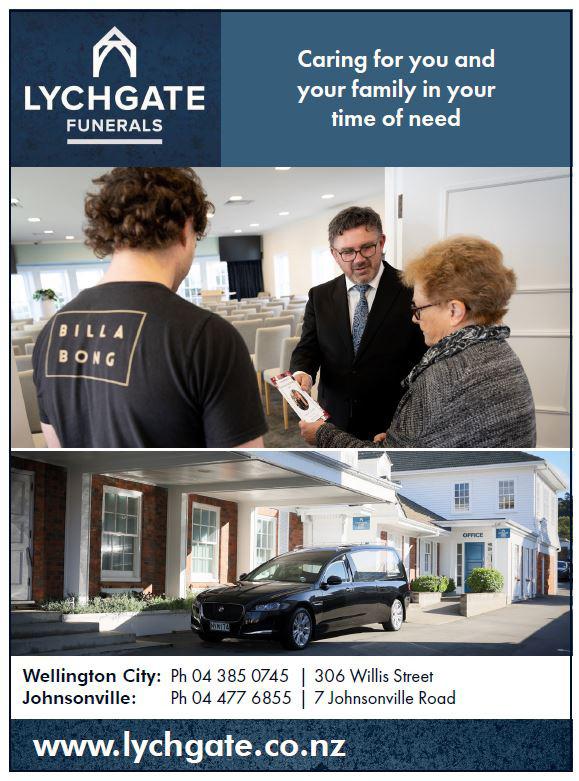
5 ISSUE 01, 2023 | WELLINGTON
Advance Care Planning
What is Advance Care Planning?
Advance care planning is the process of thinking about, talking about and planning for future health care and how you want to be cared for when you can no longer make decisions.
An Advance Care Plan (ACP) is a road map for your health journey. It helps start conversations with your whānau and loved ones about your end of life.
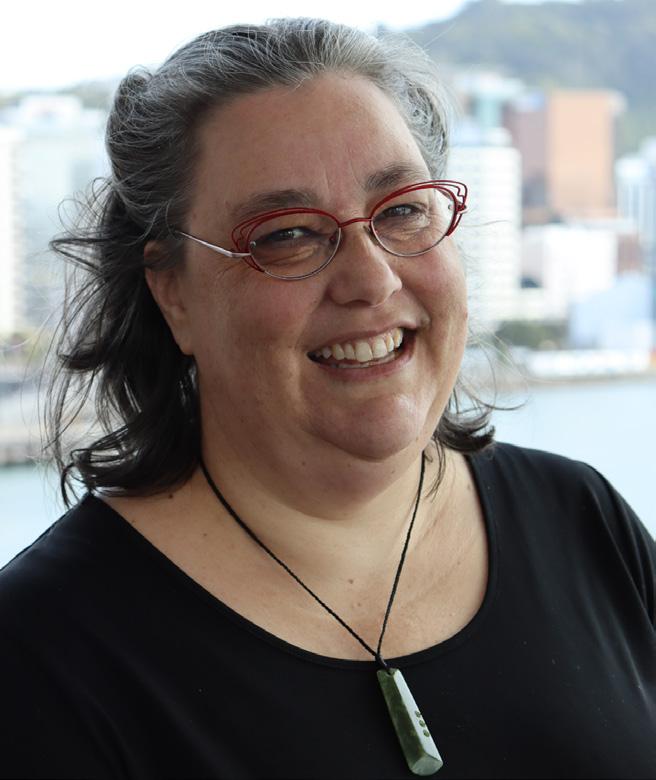
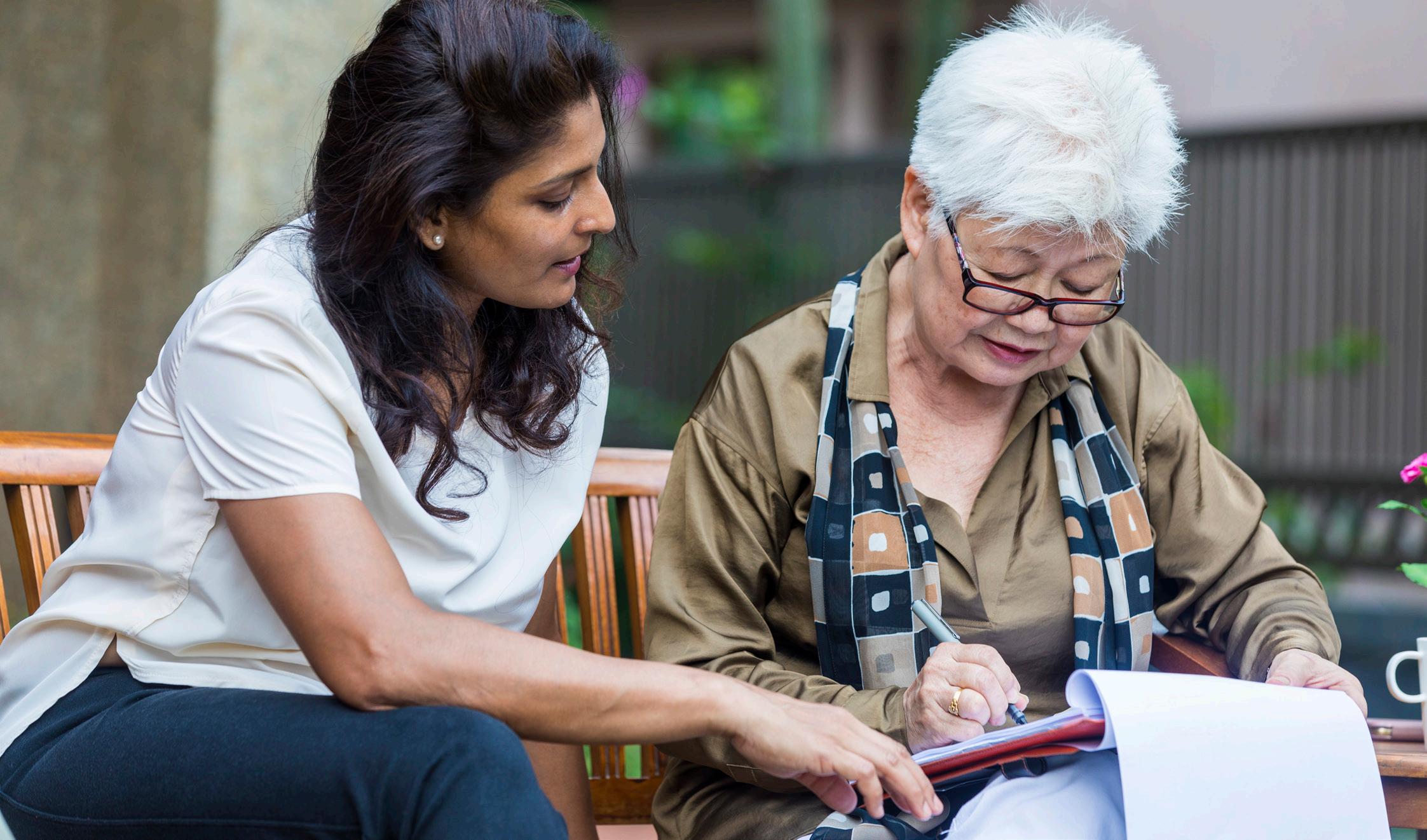
We can help you with your Advance Care Plan
Our Advance Care Planning Service is free and is tailored to individuals. Our ACP specialist can come and visit you, and help you prepare your plan.
Your ACP is a living document which can be reviewed and changed at any point. When
you have completed your ACP, we can support you in filing it with your GP and the hospital.
Phone 04 499 6646 or 021 022 75534 Email acp@acwellington.org.nz or Visit www.acwellington.org.nz for more information
6 SENIORITY | Serving the needs of older people
KAY WEBSTER Age Concern Wellington Region’s ACP Coordinator
A message from Prime Minister Chris Hipkins

When I took on the job of Prime Minister, I made a commitment to focus on the bread and butter issues that matter most to New Zealanders. That’s why, in my first few weeks in the role, we put in place extra cost of living support and raised wages.
The steps we’ve taken to help smaller budgets stretch further, like extending the fuel tax cut, are already making a difference for many. However, at a time when global factors like inflation are pushing up prices here at home, we need to do more to support New Zealanders.
As part of this work, I recently announced that recipients of Superannuation will receive an inflation increase of 7.22% from 1 April. This will see a couple who are both aged over 65 receive $102.84 more in total a fortnight and a single person living alone receive an extra $66.86 each payment. This builds on the increases that we’ve made to Superannuation since taking office in 2017.
While this boost to Superannuation alone won’t solve everything, it will ease some pressure - and right now, I know every bit helps.
On top of this, our Winter Energy Payment will help older New Zealanders heat their homes over winter. This annual support restarts from 1 May, helping with power bills through the colder months so people can stay warm and healthy, with less financial stress. A single person will receive more than $80 a month and couples will receive more than $125 per month.
Measures like these sit alongside a range of programmes that support older New Zealanders. For example, we’ve made doctors’ visits cheaper for hundreds of thousands of people, and we’ve taken steps to improve the health system and cancer care, including through record investments in Pharmac’s medicines budget.

Right now, we also need to make sure people feel safe and supported as we continue to respond to some of the most significant weather events in our history.
My back to basics approach means a greater focus on the issues that matter most to New Zealanders, here and now. As I’ve signalled, the cost of living and cyclone recovery will continue to be our top priorities, and you will see this reflected in our upcoming Budget.
Authorised by Rt Hon Chris Hipkins MP, Parliament Buildings, Wellington Advertorial
7 ISSUE 01, 2023 | WELLINGTON
Volunteers Going Above and Beyond
Age Concern Wellington Region has introduced the ‘Outstanding Volunteer Award’, designed to recognise and appreciate our volunteers who go the extra mile for seniors.




Three amazing recipients were presented with awards in December 2022 – Joan Robertshawe, Carol Bradnock and Allan Johnson.

“All three recipients of our Outstanding Volunteer Award are incredible examples of the personal commitment all our volunteers make to help us reach isolated and lonely seniors,” CEO Stephen Opie said. “But Joan, Allan and Carol also go above and beyond the call of duty every week – they give so much of their time that we wanted to recognise this publicly. They are a shining example of kindness.”
Age Concern is very thankful for all service volunteers and their work. Each one deserves an award!
8 SENIORITY | Serving the needs of older people
Age Concern Wellington Region Patron, Lady Susan Satyanand and volunteer Allan Johnson
Lady Susan Satyanand and volunteer Allan Johnson
www.seeyouathome.co.nz
CEO Stephen Opie and volunteer Joan Robertshawe
Do you find it difficult to leave home for an eye exam? HOME VISIT OPTOMETRIST A full eye exam in your home, for those with impaired mobility or those in rest homes in the Wellington area
Yvonne Shepherd
Events
Event Dates
Vogelmorn Pop-Up Hub for Seniors
28 February 2023, 2pm. Call 04 499 6645 or drop-in
Vogelmorn Pop-Up Hub for Seniors
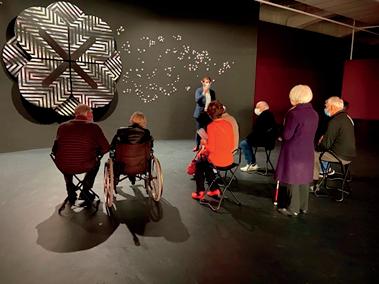
23 May & 27 June, 2pm
Call 04 499 6645 or drop-in
Census Support Drop-In:
Seatoun Pop-Up Hub for Seniors
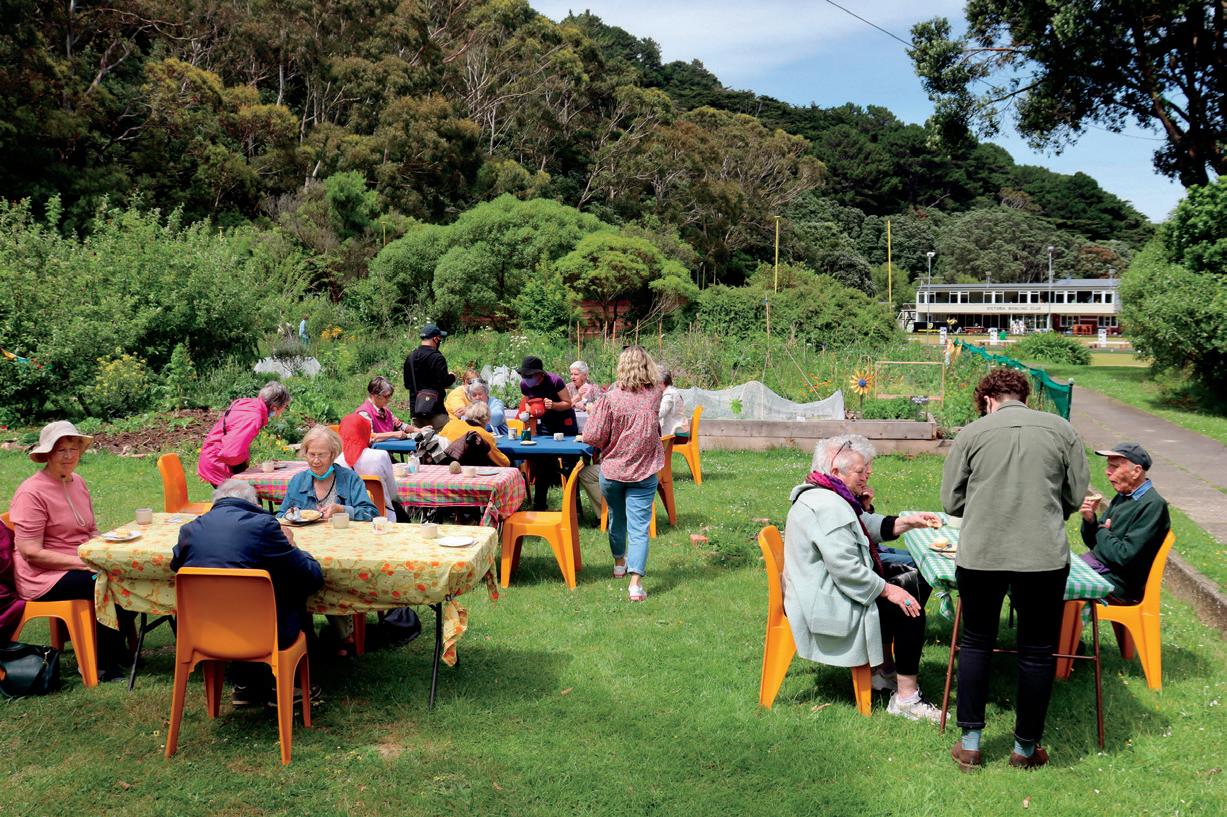
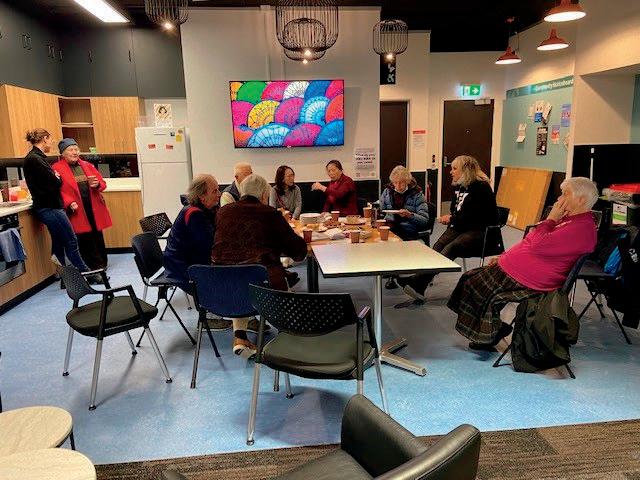
1, 2, 6 March 2023
4 April, 2 May & 6 June, 12pm
Call 04 499 6645 or drop-in
Manners Street Coffee Group
Manners Street Coffee Group
13 April 10 am
9 March 2023, 10.30am. Call 04 499 6645 or drop-in
– special intergenerational morning
11 May & 8 June, 10.30am
Call 04 499 6645 or drop-in
Linden Pop-Up Hub for Seniors
14 March 2023, 1pm. Call 04 499 6645 or drop-in
Linden Pop-Up Hub for Seniors
11 April, 9 May & 13 June, 1pm
Call 04 499 6645 or drop-in
Staying Safe course for older drivers. Khandallah.
Staying Safe course for older drivers
24 May, 28 June & 30 August, 10am
15 March 2023, 9.45am. Call 04
Call 04 499 6646 to register
City Gallery Tour
City Gallery Tour
18 May & 15 June, 1.30pm
16 March 2023, 1.30pm. Call 04
Call 04 499 6645 to register
Stokes Valley Pop-Up Hub for Seniors
Stokes Valley Hub
20 April, 18 May & 15 June, 2pm
Call 04 499 6646 or drop-in
16 March 2023, 2pm. Call 04 499 6646 or drop-in
Upper Hutt Pop-Up Hub For Seniors
More Information:
April 12 2023, 12pm
Phone: 04 499 6646
Call 04 499 6646 for details
Email: info@acwellington.org.nz
Website: www.acwellington.org.nz
More Information:
Facebook: www.facebook.com/ageconcernwellington
Phone: 04 499 6646
Email: info@acwellington.org.nz
Website: www.acwellington.org.nz
Facebook: ageconcernwellington
9 ISSUE 01, 2023 | WELLINGTON
499 6648
499 6645
SENIORITY 10
Walking and Talking
Wellington is full of interesting people with extraordinary stories; you just have to meet them, take your time, ask a few questions, and the stories will come out. Ross and Gabrielle have completely different stories to tell, but they have a common link through the Companion Walking Service. This means they still get out and about for a walk and a talk, with occasional stops to get their breath, chat with friends they meet or just smell the roses.
Ross Dunn retired from his travel agency business about eleven years ago and looked forward to keeping active in retirement. He planned on regular meetings with mates, walking in the local area, working in his garden and maintaining his watch over the ships entering the harbour from his conveniently placed desk with a view over Lyall Bay and the harbour entrance.
After a shaky start (at the age of three months he was lucky to survive the 1931 Napier earthquake) Ross spent his childhood in Napier. His interest in ships started during his schooldays as he watched them coming and going from the port of Napier. This led to a move to Wellington for a job as an office boy with the Union Steam Ship Company beginning with the task of delivering documents to the ships by bicycle in all weathers – wind, rain, or shine – the mail had to get through.
After six years of training in the shipping business he moved to a travel agency and, having learned intricacies, he took the bold step to set up his own business.
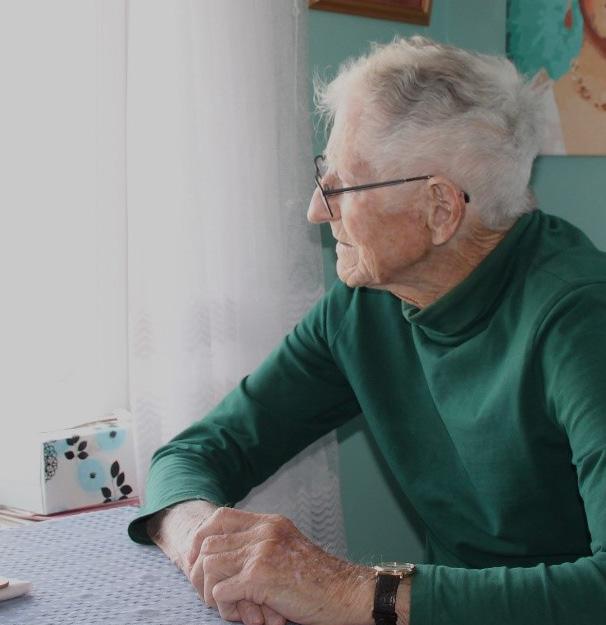
In addition to the usual personal and business travel arrangements, he maintained his
shipping interests by specialising in organising shore trips for cruise line passengers, initially in Wellington but later extending to the other major ports around the New Zealand coast. The cruise lines’ management haggled for the best prices but once the contract was signed, they were fine to deal with according to Ross.
However, the business could get financially tricky if bad weather or other circumstances cancelled the port visit. At short notice, except in unusual circumstances, no payment was made to coach or other local operators for that day. Passengers were not charged for a “no show”, so the port operator (Ross in this case) would be saddled with the costs of guiding-staff pay, some tour lunches, and travel to and from the port, with no money coming in.
Ross reckons that the ideal number of passengers was around 750 per ship, but getting them organised was like herding cats. Ross imagines the modern cruise ships with over 4,000 passengers must be a logistical nightmare.
The business had its perks with familiarisation trips throughout New Zealand and to many
10 SENIORITY | Serving the needs of older people
overseas destinations. So, when he retired Ross considered he had seen most of New Zealand and the best bits of other countries.
Although he kept active working in the garden, he began to have leg problems and his GP advised more exercise, so he went back to playing table tennis. Unfortunately, when playing a doubles match his partner lunged for a return and pushed Ross out of the way. Ross fell and broke his hip, which slowed him down and significantly changed his retirement plans.
He could get around the house and still work in the garden with some help, but he needed a stick for walking outside and was concerned about venturing too far on his own.
A friend gave him a copy of the Age Concern Companion Walking Service brochure; he signed up and was matched with Michael Knight, who just happens to be the Chair of the Age Concern board. They walk around the Lyall Bay area with plenty of routes to choose from, and the conversation can range over topics as diverse as the share market to sport – particularly golf.
Ross enjoys the walks and the conversations but if the discussion gets too deep and meaningful, there is the risk of not seeing potholes or other hazards. Sometimes it is better to stop walking and keep talking.
In addition to the weekly walks, Ross maintains a full schedule of activities. He drives to do the shopping and to keep in practice, meets friends for a chat on Fridays, works in the garden (with some help), attends Probus meetings, and monitors the shipping
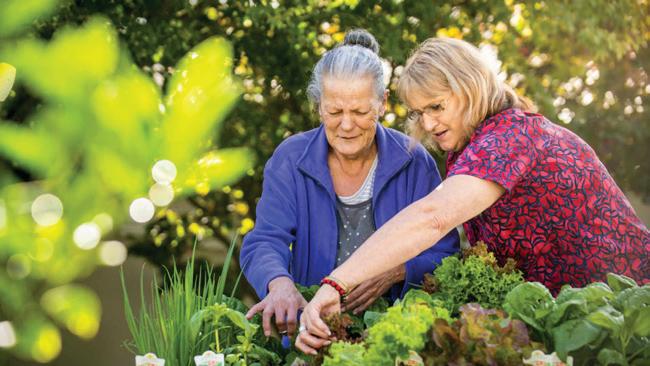
arrivals and departures to ensure they are on time. It’s in his blood.
Early on Friday mornings Age Concern’s volunteer Kate Belianskaia rings Gabrielle McLeavey to discuss the weather outlook for later in the day, and the prospects for a walk that afternoon. If the weather prospects are acceptable, Kate turns up later in the afternoon to walk with Gabrielle around the streets of Thorndon. The walk is also a history lesson as Gabrielle has had a long association with the area.
Gabrielle’s family have lived in Thorndon since her grandfather, James Harriss bought the house in Goring Street in 1905 just five years after it was built. Gabrielle was only 20 months old when her father died, and the family moved to Goring Street so that grandma could look after Gabrielle while her mother went to work.
11 ISSUE 01, 2023 | WELLINGTON
Walking and Talking
Continued from pg11
In those days the milkman delivered using a horse and cart, trams ran up and down Tinakori Road, and food shopping involved separate visits to the greengrocer, butcher, and grocery. Gabrielle went to St Mary’s College and had an after-school job at the Adult Education Centre. She eventually became a shorthand typist and was offered a job at Adult Education, but she wanted to be in the centre of town. Joining AMP insurance, she worked for four accountants before moving up to be Personal Assistant and Secretary. She still walked to work from Goring Street.
As a result, Gabrielle has a good knowledge of Thorndon and its developments over the years. The Goring Street Cabaret* has been converted to flats, New World supermarket has replaced the Lion brewery, the motorway arrived, and Certified Concrete departed. Five generations of the Harriss Family in Goring Street witnessed these changes over the years.
Gabrielle learned of the Companion Walking Service after a long stay in hospital four years ago. She was being fitted with a heart pacemaker and unfortunately suffered from an infection related to the wiring which involved further surgery and three months in hospital where she ‘celebrated’ her husband Michael’s 80th birthday. Regrettably Michael died a year later.
She suffers from occasional dizziness and some breathlessness, so uses the medical alert system. She was apprehensive about going out walking on her own and the hospital service put her in touch with Age Concern Wellington Region to organise a companion to accompany her for walks in her local area.
Having a companion has helped her enormously on her weekly outings. Kate, her second companion, is from Russia and speaks
perfect English so they generally get along well during their walks around the Tinakori Road area.
Gabrielle appreciates the time taken by the volunteers and looks forward to the weekly phone call to set up the next walking (and history) session. Having a companion makes the time pass quickly and occasionally they walk further than planned.
At the age of 81 Gabrielle still drives her car and takes herself off to the Steady As You Go class in Karori each Monday. The weekly classes give her another outing to look forward to, assists with her mobility and balance, and she enjoys the social side of meeting and talking to others before and after the exercise sessions.
The Companion Walking Service aims to improve the lives of older people, especially those living alone who may seldom get out of their homes. This may be because they have a medical condition that makes them feel unstable walking alone, they may simply have lost confidence in their walking ability, they may want to go further afield but are afraid it will be too much for them, or they may just enjoy having someone to talk to. Contact Age Concern Wellington Region for more information, either as a volunteer or a client of the walking service, or about Steady As You Go falls prevention exercise classes.
*A dance school by day, a jazz cabaret by night. Wellington’s Goring Street Club bothered the neighbours. Cars tooting, clubgoers laughing and shouting, the drinking (or not) of alcohol, how many nights the club was open each week and how late, and an evening spent there by the Prince of Wales all provoked controversy in 1920. Te Ara. Encyclopaedia of New Zealand.
12 SENIORITY | Serving the needs of older people
The Importance of Balance
ANN DALZIEL
Are you unsteady on your feet? Do you have balance problems, especially as you get older?
Recently, an article published in the Guardian Weekly (UK) drew attention to the subject of balance. Many of us take it for granted - until we don’t have it anymore!
So, what is balance, and why do you lose it with age? Well, it is incredibly complex, involving joints, muscles, nerves, eyesight and the inner ear. As we age, decreased motor skills can lead to unsteadiness. This, combined with serious health issues can make it hard to balance. A decade-long study concluded that an inability to balance was associated with an almost twofold increase in risk of death.
Volunteers were asked to stand on one leg with the other pressed against it, arms by their side and eyes fixed straight ahead. After accounting for age, sex, and other underlying health conditions, an inability to hold the position for 10 seconds was associated with an 84% heightened risk of death from any cause.
Significant loss of balance is a medical problem without a medical solution. Prevention is better than a cure, so a
programme designed to help improve balance may help stop the downward spiral.
This is where Age Concern’s Steady As You Go falls prevention exercise classes come into their own. The programme has been operating since 2003. Age Concern Otago, in association with the University of Otago Physiotherapy Department, devised a programme that would scientifically improve strength and balance.
Fortunately, we are lucky in Wellington to be able to access a number of these classes. They are very effective, only need to be done once weekly, and are proven to improve balance and reduce the chance of falling.
To make matters even more attractive, they are available for a mere $2 donation per session. If you are in any way concerned about your balance and the possibility of falling, why not try one of our 30 classes around the Region? They are fun and you will be made very welcome.
Visit the Age Concern Wellington Region website or call 04 499 6648 to find more information about our Steady As You Go classes.

13 ISSUE 01, 2023 | WELLINGTON
Stroke & Mobility
From the Stroke Foundation
Like many long-term health conditions, stroke can turn your world upside down. Simple actions like speech, movement, and clearthinking can suddenly become a challenge.
Stroke can affect how you sit, stand, feel, think, and behave. It can throw you off balance and make it extremely difficult to leave the house or even move around your home.
Today, we’re facing a stroke tsunami. There are currently 350,000 people in Aotearoa living with the aftereffects of stroke. By 2028, this figure will rise by 40 per cent.
With more New Zealanders living with stroke than ever before, it’s crucial to improve our understanding of the condition and how it can change our lives – and the lives of our whānau – in an instant.
While most people understand that stroke can limit your mobility, many don’t know how and why, or what stroke survivors can do to regain their independence.
Here, we break down a few of the specifics to help you understand the effect this complex and often overlooked long-term health condition has on mobility.
What causes stroke?
A stroke is a brain attack. It happens when a blockage, such as a clot, prevents blood flow to the brain, or when a burst blood vessel leads to a brain bleed.
During a stroke, the cells in the affected part of the brain start to die and cannot work properly. This can affect a person’s ability to
walk, talk, read, or socialise – many of the things that gave their life meaning before their stroke.
How can a stroke affect mobility?
Different parts of the brain control a person’s movements, senses, emotions, and intellectual functions. The effects of stroke depend on which part of the brain is damaged and how severe the damage is.
This can affect a person’s mobility in a number of ways. It can lead to anything from weakness in your hands, feet, and side, to partial paralysis, which is called hemiplegia.
Hemiplegia can occur on your right or left side. It often requires people to relearn how to roll over in bed, move from sitting to standing, or from a bed to a chair or a toilet. They may even have to relearn how to walk.
Stroke can affect your mobility in more subtle ways as well. Many people have difficulty keeping their balance or feel dizzy and unsteady when they stand up. Some experience stiffness or tightness in their muscles. This is called hypertonia. When your muscles are floppy, it’s called low hypertonia.
Others may experience changes in sensation, such as pins and needles or increased sensitivity – known as hypersensitivity. Many stroke survivors experience fatigue, localised pain, and swelling in their legs or feet.
What support is available?
Stroke affects everyone differently and the picture is extremely varied. Some people will experience one or more of these symptoms after a stroke, while other people’s symptoms will manifest differently.
14 SENIORITY | Serving the needs of older people
There is plenty of support out there to build your mobility back after a stroke. However, it can be difficult to know where to turn. Physiotherapists can assess your mobility and work with you to set goals and develop a rehabilitation program to meet your needs.
They can prescribe exercises to improve your strength, coordination, balance, and fitness. This often starts with simple task-specific actions like standing or walking, helping you take gradual steps toward greater mobility.
Recovery from stroke is difficult to predict. The progress someone will make and the amount of time it takes varies – from several weeks or months – up to multiple years.
Can I drive after a stroke?
Getting back behind the wheel is usually a priority for people who have experienced a stroke – particularly when they need to attend follow-up medical appointments. Unfortunately, you cannot drive for one month after a stroke occurs.
This stand down period isn’t a result of your symptoms – it’s to prevent you having another stroke, seizure, or other neurological problems while behind the wheel of a car.

There are plenty of transport services for stroke patients out there. In some areas,
there are volunteer drivers who will take you to and from appointments or outings and most District Health Boards (DHBs) provide a shuttle service which is helpful for getting to hospital appointments. More information is available at www.stroke.org.nz or phone 0800 78 76 53
Stroke Foundation of New Zealand

The Stroke Foundation of New Zealand works with stroke survivors, their whānau, and carers to achieve the best possible outcomes for people in their lives after stroke.
We know everyone has a different journey to recovery. Factors such as age, health, and family support can dramatically change a person’s experience of life after stroke. That’s why our Community Stroke Advisors work with clients to create recovery plans that are right for them.
To find out how our Community Stroke Advisors could help you or someone your love, call 0800 78 76 53, email strokenz@ stroke.org.nz or visit www.stroke.org.nz
15 ISSUE 01, 2023 | WELLINGTON
Dear John
Dear John,
Over the Christmas holidays we visited friends and relatives, as we normally do at that time of year. I was upset seeing my oldest cousin who was definitely not her usual self. She lives alone, but is normally a fiercely independent widow who is involved with church committees, walking groups, and her garden.
Apparently just before the holidays she slipped and badly sprained her ankle. The results have been catastrophic for her – she cannot get out to do her shopping, meet friends, go to church etc. From one small incident, her life has changed dramatically!
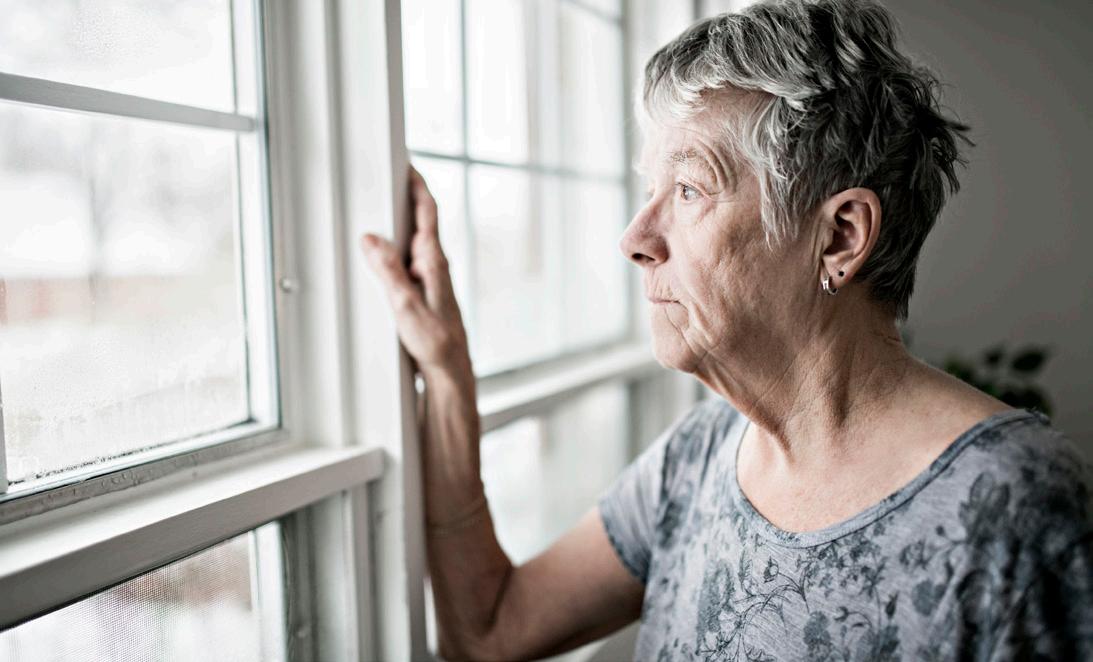
Do you have any suggestions?
Susan, Belmont.
Hello Susan, Yes, one small incident can often have a number of unforeseen consequences. Due to lack of mobility her social connectedness has declined and along with it, her confidence. She may even be a little depressed. I suspect she hasn’t shared this with her friends as she probably doesn’t want to appear ‘needy’. However, this is only my impression, and she should really use professional medical advice.
If she has not already done so, I suggest that she contact her GP or the practice nurse, first of all, to assess the damage and advise treatment. They may even organise some physiotherapy if appropriate.

Once she has permission to resume very gentle activity, she could contact Age Concern Wellington Region. They have a wonderful service called the Companion Walking Service. This places a trained volunteer with a client to take them for gentle walks, but also there is the added confidence of not walking alone. This may be a good way of getting her started on her journey to recovery.
Later, she could think about attending one of the Steady As You Go classes, which are designed to avoid falling (and only cost a couple of dollars!). Both would be good for her - both physically and mentally, and are a great way of meeting people.

I hope this helps.
John
16 SENIORITY | Serving the needs of older people
Level 2, 15 Courtenay Place | (04) 385 9144 In the mall 10/2 Mahara Place, Waikanae | (04) 293 4170 SeeHear, 174 Oxford Street | (06) 368 0130 8A Ihakara Street | (04) 385 9144
Spotted
Out & About
Staying Safe course for older drivers in Khandallah, March 2023
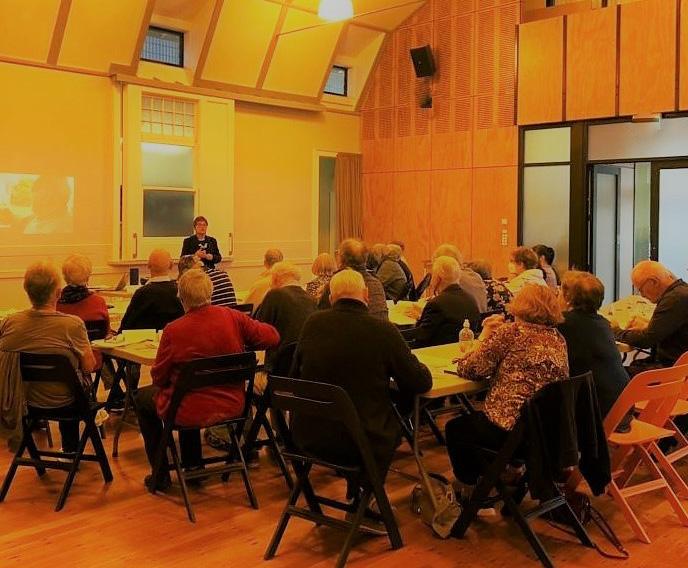

Who knows what You Want?
You might have already thought of the music and readings you’d like to have at your funeral - but does anyone else know?
To help you with the many choices available, Gee and Hickton Funeral Directors are offering, free of charge, a kit - My Life, My Funeral. For our free information kit, or to discuss how to make the right choices for you, please phone at any time.
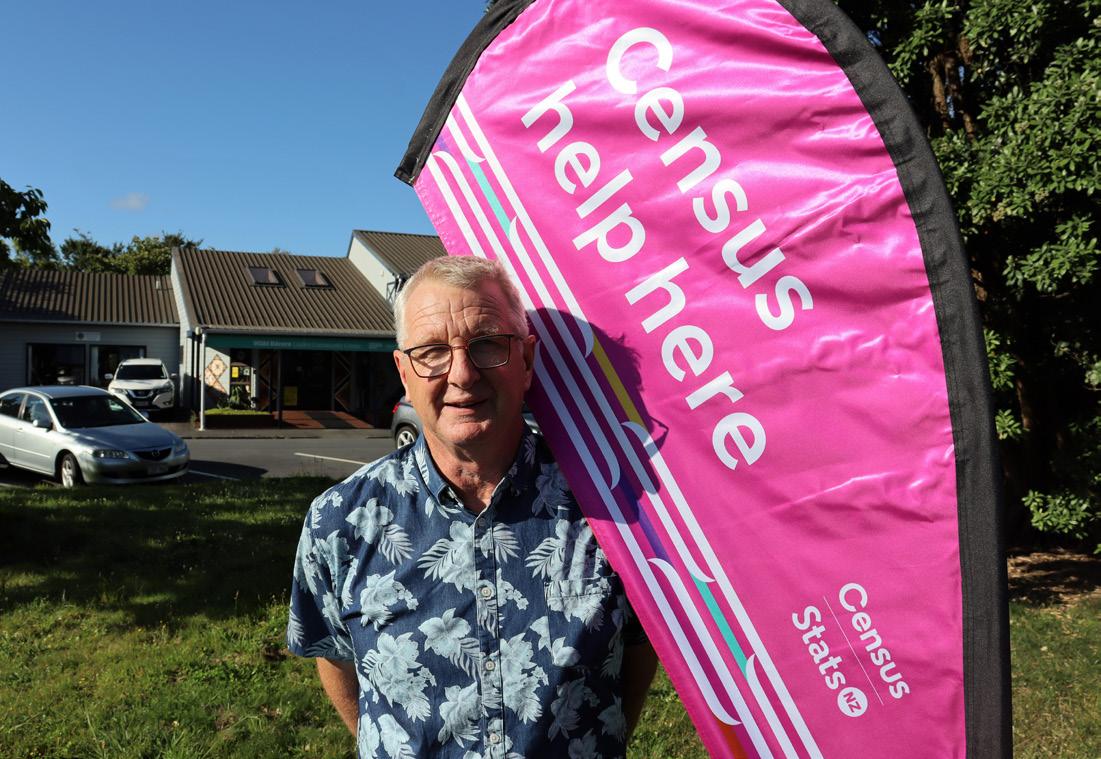
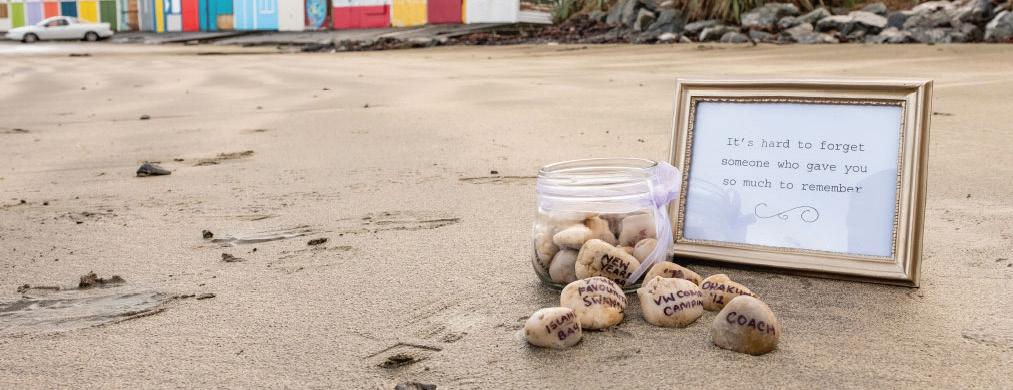
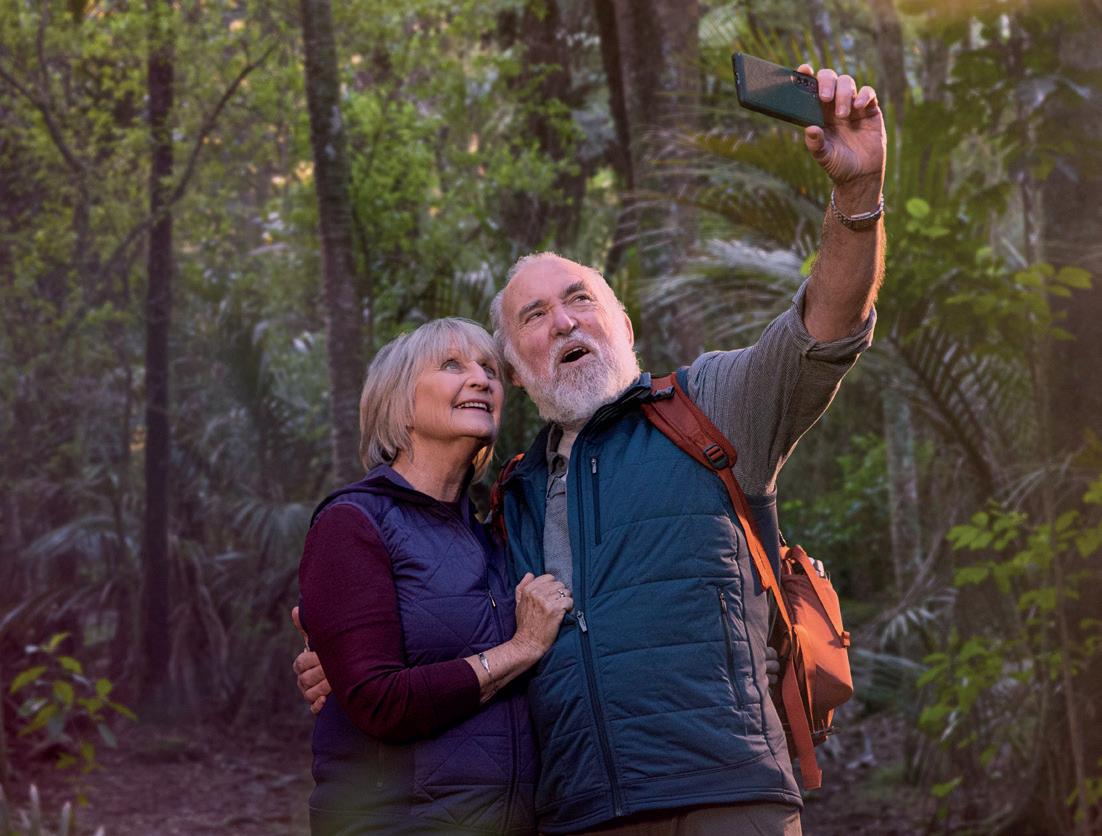
528 2331
Upper Hutt | Kingswood, Cnr King & Cairo Sts, Upper Hutt
5 66 3103
Lower Hutt | Cornwall Manor, Cnr Knights Rd & Cornwall St

17 ISSUE 01, 2023 | WELLINGTON
www.geeandhickton.co.nz | www.ecofriendlyfunerals.co.nz
Volunteer Allan helping with one of our Census support events in March
Grace & Meera – Happy Connections
Walking up to Grace’s house in a quiet neighbourhood of Lower Hutt, you are immediately struck by the colourful garden bordering the drive and surrounding the house in style of traditional gardens. It is immaculate, colourful, and perfumed with the beautiful scent of all the roses. The abundance of colours in the front garden is a great introduction to the lovely lady who lives inside.
As you step into the house, the walls are covered with stunning artworks. From landscapes to floral pieces, every work was lovingly painted by Grace.
With some gentle persuasion and input from the Age Concern visitor, Meera, Grace told us a little of her early days in Petone where a good grounding in a commercial course led to office work – a career she stayed in until her retirement.
Married in 1951, Grace and her late husband raised three children, all of whom are successful in their own careers. Their home was built by her husband and is now her haven.
At 35, Grace began to paint. She attended a local art society and found her love of watercolour. All the art in her house is her work. When complimented, she humbly waves it off. She insists that her painting skills are just a ‘knack’, rather than a true talent.
She still paints, 56 years later. She is currently working on painting her sister-in-law’s bachbut can’t get the fence right. It’s her twentieth go at it, but as she says, “I do not give up on anything I like to do, ever.”
Grace’s other current project is to paint all the houses that have been significant to her throughout her life – whether this includes her
childhood home, her family’s houses or her husband’s old house in Berhampore.
Despite her keen interest in her painting hobby, Grace still gets lonely sometimes. There are plenty of very welcome visitors, but the quietness of the evenings, with no spontaneous chat is a challenge. Though she says she had great friendships throughout her life, she misses many of the people she used to have in her life.
She struggles with mobility now and doesn’t go outside of her house for fear of falling. Even though she affectionately calls her walker her ‘Rolls Royce’, it does not allow her to move at any significant speed. Thankfully, Meera is there to help her, even if Grace is stubborn and wants to get things for herself.
18 SENIORITY | Serving the needs of older people
ASHLEIGH WEYERMAYR
Grace met Meera about a year ago through a friend of a friend, and the weekly meetings are always welcome with lots of talk and plenty of laughs and reminiscing. Meera is a volunteer with Age Concern Wellington Region’s Visitor Service. She’s been working with Age Concern for five years and absolutely loves it. She says it “gives an extra dimension to her life” and she gets a lot out of it.

Meera describes Grace as a people person who loves meeting others. They get along well. After they joke around, Grace chuckles and

questions, “Where would I be without Meera?”
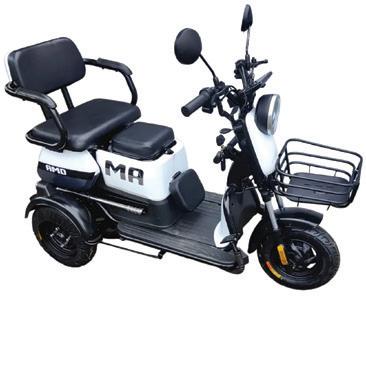
They keep in touch outside of their oncea-week catch ups. When Meera goes on holiday, she sends Grace lots of pictures. Their connection makes them both feel more fulfilled and thankful for the other.
With a cheeky grin, Grace quotes: “As long as you can keep laughing, you can stay alive for ever.”

19 ISSUE 01, 2023 | WELLINGTON Regain your independence with your very own TM3 Trike. Go wherever you want to go in supreme comfort and classic style. Hassle-free ownership with no licence, no registration and almost no maintenance. Plus, have peace of mind with fantastic personal local support, local repair and local parts from EV Bikes. Order yours today and get your very own TM3 Trike for only $4,500 tested and delivered right to your door. Buy online or call us and get back your independence today! Get back your independence. ★ ★ ★ ★ ★ CALL US 0800 222 249 ★ ★ ★ ★ ★ BUY ONLINE EVBIKES.CO.NZ
Grace & Meera
Steady As You Go Falls Prevention Exercise Classes
DAY TIME LOCATION
Monday 10am Seatoun Village Hall, 22 Forres Street, Seatoun
Monday 10.30am Karori Community Centre, 7 Beauchamp St, Karori
Monday 11am Knox Church Lower Hutt, 574 High Street, Boulcott
Monday 12pm St Peters Church, Garden Room, 170 Victoria Street, Te Aro
Monday 1.30pm Walter Nash Centre, 20/22 Taine Street, Taita
Tuesday 11am Koraunui Stokes Valley Hub, 184 Stokes Valley Rd, Stokes Valley, Lower Hutt
Tuesday 11am Holy Trinity Anglican Church, 40 Wainuiomata Rd, Wainuiomata
Tuesday 1pm Vogelmorn Hall, Mornington Rd, Brooklyn
Tuesday 1pm Johnsonville Uniting Church, 16 Dr Taylor Terrace, Johnsonville
Wednesday 9.30am Live Online Class, Zoom
Wednesday 12pm All Saints Church, Hataitai, 90 Hamilton Road, Hataitai
Wednesday 12pm Eastbourne Community Hall, Tuatoru St, Eastbourne, Lower Hutt
Wednesday 1pm Whirinaki Whare Taonga Arts & Entertainment Centre (Expressions), 836 Fergusson Drive, Upper Hutt
Wednesday 1.30pm Walter Nash Centre, 20/22 Taine Street, Taita
Wednesday 12pm Karori Community Centre, 7 Beauchamp St, Karori
Thursday 10.30am Brooklyn Rec Room, Central Park, 21 Brooklyn Road, Wellington
Thursday 11am Newlands Community Centre, 9 Batchelor St, Newlands *from 6 April
Thursday 12pm Tawa Community Centre, 5 Cambridge Street, Tawa
Thursday 1pm Koraunui Stokes Valley, 184 Stokes Valley Rd, Stokes Valley, Lower Hutt
Friday 10am Johnsonville Community Centre, 3 Frankmoore Avenue, Johnsonville
Friday 11am St Mary’s Church Hall, 69 Discovery Drive, Whitby *from 3 March
Friday 1.00pm Loaves & Fishes, Wellington Cathedral of St Paul, 2 Hill Street, Thorndon
20 SENIORITY | Serving the needs of older people





 Stephen Opie
Age Concern Wellington Region CEO
Stephen Opie
Age Concern Wellington Region CEO




































